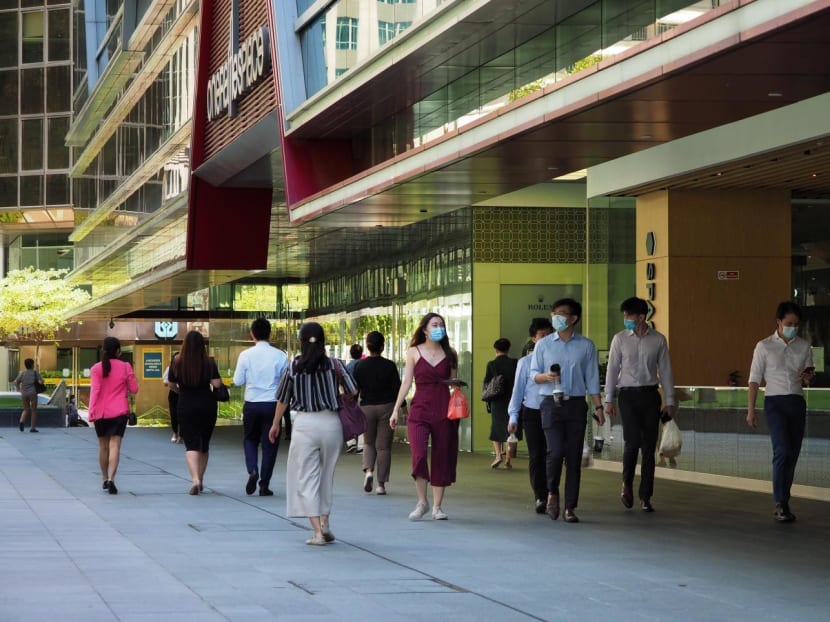Younger workers less willing to accept lower pay for benefit of family or personal life: IPS survey
SINGAPORE — Younger workers are less willing than their older counterparts to accept lower pay or a smaller work role for the benefit of their family or personal life, a study by the Institute of Policy Studies (IPS) released on Monday (Jan 16) has shown.

People walking during lunchtime in the financial district of Singapore.
- A study showed that 49 per cent of people aged 35 to 54 and 53 per cent of those aged 21 to 34 are willing to make the trade-off between more family and personal time, and lower job status
- This is compared to more than six in 10 respondents aged 55 and above who are willing to do so
- About two in three respondents think it is likely that the way work is done in their current roles will change significantly in the next few years
- The survey also found that professionals, managers, executives and technicians are more likely to find meaning and purpose in their work than those in vocational roles
SINGAPORE — Younger workers are less willing than their older counterparts to accept lower pay or a smaller work role for the benefit of their family or personal life, a study by the Institute of Policy Studies (IPS) released on Monday (Jan 16) has shown.
The study showed that just under half of those aged 35 to 54 and 53 per cent of those aged 21 to 34 are willing to make this trade-off between more family and personal time, and lower job status.
In comparison, more than six in 10 respondents aged 55 and above are willing do so.
The study, titled "Survey on Singapore workforce’s preparedness for the future of work, their work aspirations and perceptions of social mobility", polled 1,010 working adult Singaporeans aged between 21 and 84 in October last year.
Its aim was to understand "how Singaporeans are likely to fare in jobs of tomorrow and where vulnerabilities may lie", a press release on the study said.
Other issues it sought to uncover include whether Singaporeans are mentally prepared for the future of work, whether they possess critical core skills, and what matters to Singaporeans at work.
Dr Chew Han Ei, senior research fellow at IPS and a co-author of the study, said: "We conducted this survey to understand how prepared Singaporean workers are to survive and succeed in a global landscape facing disruptions and major restructuring, as well as our ageing demographic."
WHAT ARE SINGAPOREANS WILLING TO GIVE UP?
- Respondents were also asked if they have ever taken a job with less pay or given up better job opportunities for the benefit of their family or personal life
- More older respondents above 55 said "yes" (37 per cent) compared to their younger counterparts (32 per cent for those aged 35 to 54 and 22 per cent for those aged 21 to 34)
- Respondents were also asked if they would be willing to accept lower pay or a lesser role for work that contributes to something more important or meaningful
- The survey found that the willingness to make this trade-off increases with age, with more older respondents above the age of 55 agreeing to do so (59 per cent) compared to those aged between 35 and 54 (44 per cent) and those between 21 and 34 (40 per cent).
HOW PREPARED ARE SINGAPOREANS FOR THE FUTURE OF WORK?
- About two in three respondents think it is likely that the way work is done in their current roles will change significantly in the next few years
- This mindset is more prevalent in respondents of higher education levels, with 69 per cent of degree holders thinking the above possibility is likely or very likely, compared to 49 per cent of those with educational qualifications below secondary level
- About three in four respondents think that they will likely have to reskill to adapt to work changes, but older respondents are less likely to think this way
- While 79 per cent of respondents between the ages of 21 and 34, and 77 per cent of those aged 35 and 54 think that there is a need to reskill themselves to adapt to changes in their career, in comparison, only 58 per cent of those aged 55 and above think this way
- Overall, three in four respondents are open to changes in their work, but this narrows with age: Those between 21 and 34 are the most open (83 per cent), compared to those between 35 and 54 (77 per cent), and those above 55 (63 per cent)
- The same trend was observed when respondents were asked if they are open to changing their occupation. About a quarter of those 55 and above indicated that they are not willing to, compared to 12 per cent in the 21 to 34 age range, and 13 per cent of those between 35 and 54
DO SINGAPOREANS POSSESS CRITICAL CORE SKILLS?
- The survey also quizzed respondents on how equipped they are in critical core skills, which are defined as "foundation skills that are transferable or generalisable across job roles and industries and increasingly in demand by employers"
- The IPS survey examines two critical core skills: Respondents’ pursuit of career self-management activities and skills, as well as their interest and self-efficacy in creative tasks and jobs. Creative self-efficacy refers specifically to people’s beliefs that they can be creative in their work roles and have the ability to produce creative outcomes, IPS said
- The survey found that women rate themselves lower in their self-efficacy of creativity skills and interest in creative work, with 79 per cent of male respondents indicating that they are confident they can solve problems creatively at work, compared to 66 per cent of female respondents
- About seven in 10 men indicated that they enjoy working in a job that requires them to be creative, compared to 63 per cent of women
- Compared to men, women also report being less likely to pursue career self-management activities, such as self-directed training and networking. Asked if they seek out career-related training or development outside their organisation, 46 per cent of men said that they did, whereas only 39 per cent of women answered the same
Explaining the discrepancy, Dr Laurel Teo, a senior research fellow at IPS and a co-author of the study, said that being creative and pursuing self-management activities requires a worker to be "different".
"It requires you to be willing and able to be comfortable with speaking up... sometimes you have to appear aggressive," she said.
"A lot of sociological and psychological studies have shown that women are socialised very differently from men, to be more conciliatory so they tend to seek consensus, and tend to not want to appear too aggressive.
"It does not mean that women are less creative, these results do not in any way point to actual ability."
WHAT MATTERS TO SINGAPOREANS AT WORK?
- The survey listed 15 different job aspects and asked respondents to rate how important they think each aspect is in a job
- On average, pay adequacy, workplace ethics and work conditions are the top three most important job aspects, while recognition, career advancement and task variety rank bottom
- The study found that younger respondents aged 21 to 34 value growth and learning as well as career advancement more than people aged 35 to 54 and those aged 55 and above
- Job security ranked lower for younger respondents compared to their older counterparts
- The survey also examined the meaning that people seek and find in their work. It found that professionals, managers, executives and technicians are significantly more likely to find meaning and purpose in their work (64 per cent indicated that they have found a meaningful career), compared to clerical, sales and service workers (42 per cent), as well as production and transport operators, cleaners and labourers (43 per cent)
- The study's co-author Dr Chew said: "We hope to draw attention to the gaps and see what we can do to help fellow Singaporeans have meaningful and decent work... It's heartening to see that now, there is political will to value vocational work, the hand and the heart work in society."
















